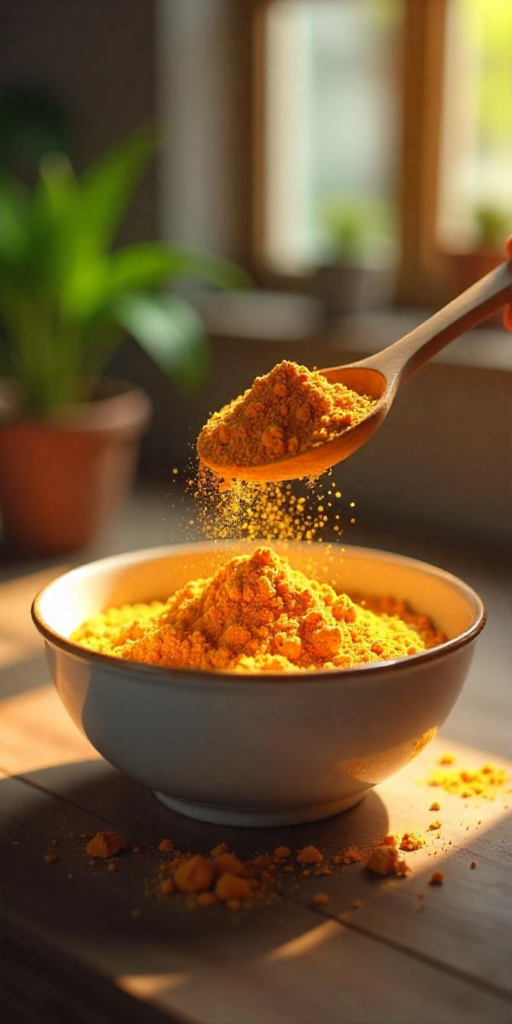Turmeric, often referred to as the “golden spice,” has been an integral part of human history for over 4,000 years. Originating in the Indian subcontinent, it has been revered not only for its vibrant hue and distinctive flavor but also for its medicinal, spiritual, and cultural significance.
In ancient India, turmeric was a staple in Ayurvedic medicine, utilized for its anti-inflammatory and healing properties. It was believed to balance the body’s energies and was commonly used to treat a variety of ailments, from digestive issues to skin conditions. Beyond its medicinal uses, turmeric held a sacred place in Hindu rituals, symbolizing purity and prosperity.
As trade routes expanded, turmeric’s influence spread across Asia and into the Middle East and Africa. In traditional Chinese medicine, it was employed to invigorate the blood and alleviate pain. In the Middle East, it became a key ingredient in culinary traditions, adding both flavor and color to dishes. By the medieval period, turmeric had reached Europe, where it was often referred to as “Indian saffron” and used as a more affordable alternative to the expensive saffron spice.
Today, turmeric is recognized globally, not only as a culinary staple but also as a subject of scientific research exploring its potential health benefits.
Health Benefits of Turmeric
Modern science has begun to validate many of the traditional uses of turmeric, particularly focusing on its active compound, curcumin. Curcumin is known for its potent anti-inflammatory and antioxidant properties, which contribute to a range of health benefits:
- Anti-Inflammatory Effects: Curcumin can inhibit molecules that play a role in inflammation, making it beneficial for conditions like arthritis and inflammatory bowel disease.
- Antioxidant Properties: It is neutralizing free radicals, and curcumin helps protect the body from oxidative stress, which is linked to aging and various diseases that turmeric can make benefits.
- Heart Health: Curcumin may improve endothelial function, which is crucial for heart health, and help reduce the risk of heart disease.
- Brain Health: Some studies suggest that curcumin can increase levels of brain-derived neurotrophic factor (BDNF), a growth hormone that functions in the brain, potentially delaying or even reversing brain diseases and age-related decreases in brain function.
- Cancer Prevention: Research indicates that curcumin can affect cancer growth and development, potentially reducing angiogenesis (growth of new blood vessels in tumors), metastasis, and contributing to the death of cancerous cells.
- Digestive Health: Turmeric has been used to aid digestion and reduce symptoms of bloating and gas.
- Mood Enhancement: Some evidence suggests that curcumin can help alleviate symptoms of depression and anxiety by boosting serotonin and dopamine levels.
Turmeric has many benefits but it is really important to note that curcumin’s bioavailability is relatively low, It means that turmerics not easily absorbed by the body. so you can , consume it with black pepper, which contains piperine, can enhance absorption significantly.
Incorporating Turmeric into Daily Life
Turmeric’s versatility makes it easy to include in various aspects of daily life:
- Culinary Uses: Add turmeric to curries, soups, rice dishes, and smoothies. It’s also a key ingredient in “golden milk,” a traditional Indian beverage made with milk and spices.
- Skincare: Turmeric’s anti-inflammatory and antimicrobial properties make it beneficial for skin health. It’s often used in face masks to help with acne and brighten the skin.
- Supplements: For those seeking higher doses, turmeric supplements are available. Ensure they contain piperine or are formulated for enhanced absorption.
- Teas and Lattes: Turmeric teas and lattes are popular ways to enjoy the spice’s benefits in a soothing drink.
- Home Remedies: In traditional medicine, turmeric is used in various home remedies, such as mixing with honey for sore throats or applying a paste to minor cuts and wounds.
Conclusion
Turmeric’s rich history and array of health benefits make it a valuable addition to any lifestyle. Whether used in cooking, as a supplement, or in skincare, this golden spice offers numerous ways to enhance well-being. As with any supplement or dietary change, it’s advisable to consult with a healthcare professional, especially for individuals with underlying health conditions or those taking medications.


